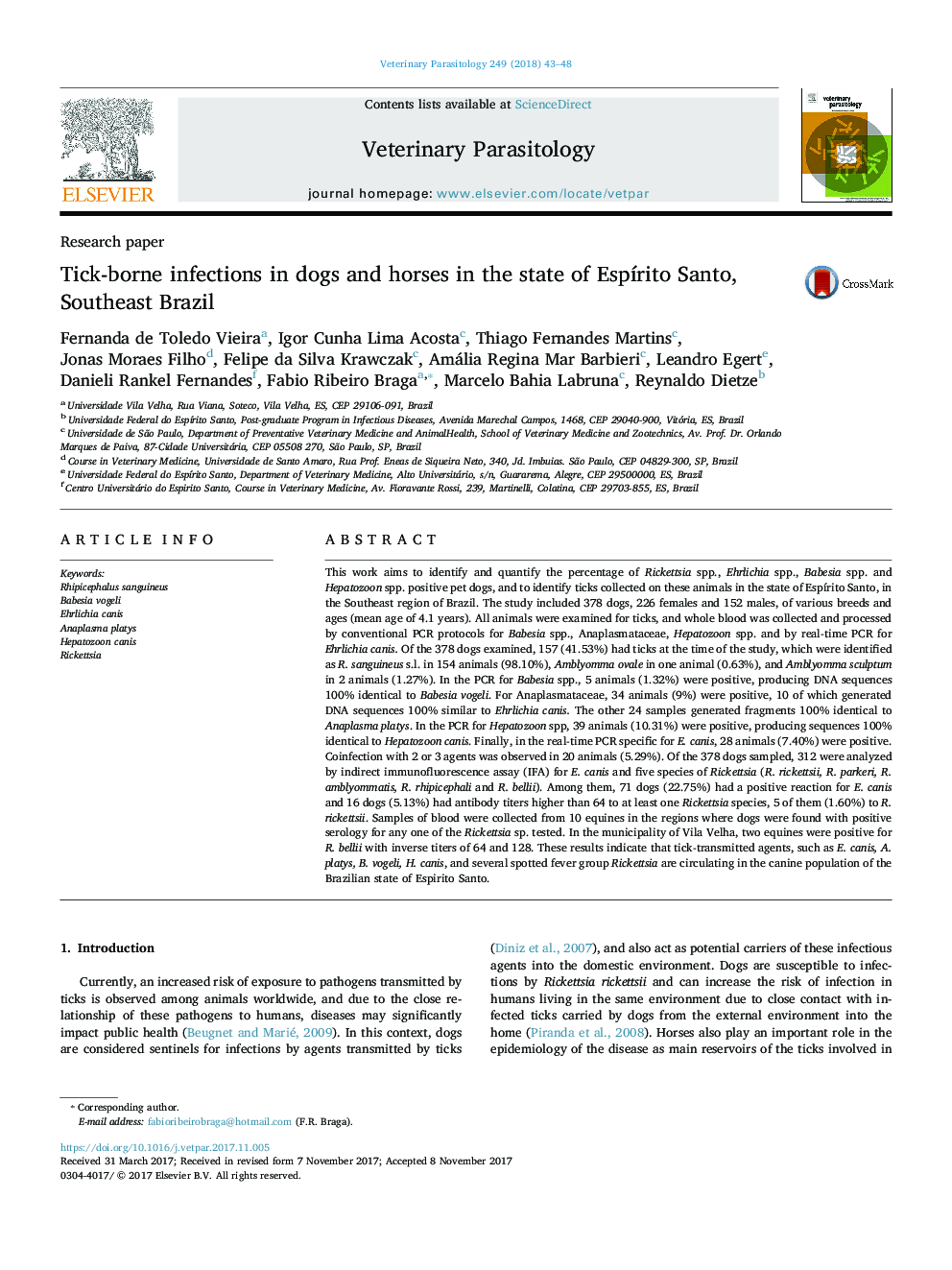| کد مقاله | کد نشریه | سال انتشار | مقاله انگلیسی | نسخه تمام متن |
|---|---|---|---|---|
| 8506164 | 1555627 | 2018 | 6 صفحه PDF | دانلود رایگان |
عنوان انگلیسی مقاله ISI
Tick-borne infections in dogs and horses in the state of EspÃrito Santo, Southeast Brazil
دانلود مقاله + سفارش ترجمه
دانلود مقاله ISI انگلیسی
رایگان برای ایرانیان
کلمات کلیدی
موضوعات مرتبط
علوم زیستی و بیوفناوری
علوم کشاورزی و بیولوژیک
علوم دامی و جانورشناسی
پیش نمایش صفحه اول مقاله

چکیده انگلیسی
This work aims to identify and quantify the percentage of Rickettsia spp., Ehrlichia spp., Babesia spp. and Hepatozoon spp. positive pet dogs, and to identify ticks collected on these animals in the state of EspÃrito Santo, in the Southeast region of Brazil. The study included 378 dogs, 226 females and 152 males, of various breeds and ages (mean age of 4.1 years). All animals were examined for ticks, and whole blood was collected and processed by conventional PCR protocols for Babesia spp., Anaplasmataceae, Hepatozoon spp. and by real-time PCR for Ehrlichia canis. Of the 378 dogs examined, 157 (41.53%) had ticks at the time of the study, which were identified as R. sanguineus s.l. in 154 animals (98.10%), Amblyomma ovale in one animal (0.63%), and Amblyomma sculptum in 2 animals (1.27%). In the PCR for Babesia spp., 5 animals (1.32%) were positive, producing DNA sequences 100% identical to Babesia vogeli. For Anaplasmataceae, 34 animals (9%) were positive, 10 of which generated DNA sequences 100% similar to Ehrlichia canis. The other 24 samples generated fragments 100% identical to Anaplasma platys. In the PCR for Hepatozoon spp, 39 animals (10.31%) were positive, producing sequences 100% identical to Hepatozoon canis. Finally, in the real-time PCR specific for E. canis, 28 animals (7.40%) were positive. Coinfection with 2 or 3 agents was observed in 20 animals (5.29%). Of the 378 dogs sampled, 312 were analyzed by indirect immunofluorescence assay (IFA) for E. canis and five species of Rickettsia (R. rickettsii, R. parkeri, R. amblyommatis, R. rhipicephali and R. bellii). Among them, 71 dogs (22.75%) had a positive reaction for E. canis and 16 dogs (5.13%) had antibody titers higher than 64 to at least one Rickettsia species, 5 of them (1.60%) to R. rickettsii. Samples of blood were collected from 10 equines in the regions where dogs were found with positive serology for any one of the Rickettsia sp. tested. In the municipality of Vila Velha, two equines were positive for R. bellii with inverse titers of 64 and 128. These results indicate that tick-transmitted agents, such as E. canis, A. platys, B. vogeli, H. canis, and several spotted fever group Rickettsia are circulating in the canine population of the Brazilian state of Espirito Santo.
ناشر
Database: Elsevier - ScienceDirect (ساینس دایرکت)
Journal: Veterinary Parasitology - Volume 249, 15 January 2018, Pages 43-48
Journal: Veterinary Parasitology - Volume 249, 15 January 2018, Pages 43-48
نویسندگان
Fernanda de Toledo Vieira, Igor Cunha Lima Acosta, Thiago Fernandes Martins, Jonas Moraes Filho, Felipe da Silva Krawczak, Amália Regina Mar Barbieri, Leandro Egert, Danieli Rankel Fernandes, Fabio Ribeiro Braga, Marcelo Bahia Labruna, Reynaldo Dietze,